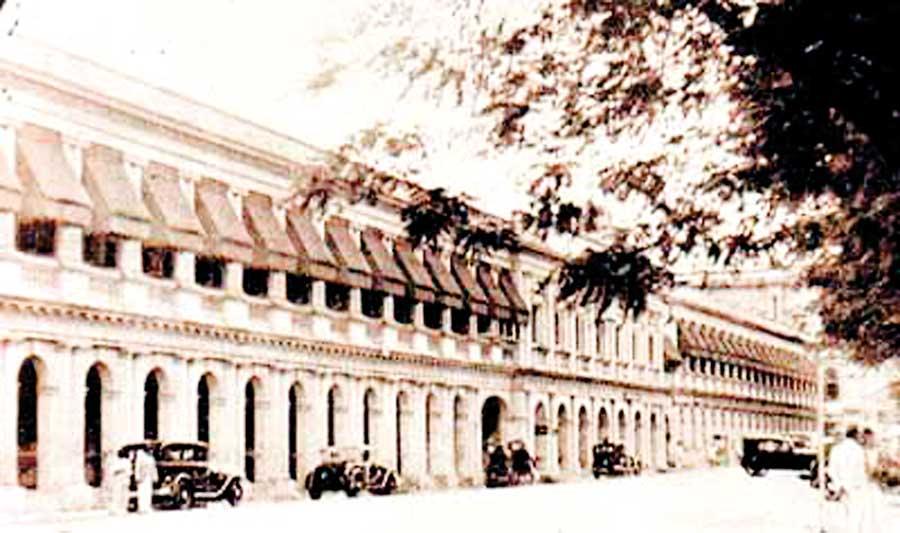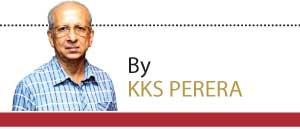Reply To:
Name - Reply Comment

AG’s word on Role of Judges…, and last Friday’s news item on two women aged 24 and 27 being killed by their husbands in separate incidents, coincided with last Monday’s article in the Daily Mirror, where he raised a very pertinent issue on the “Crimes without Criminals”, quoting a few famous [or infamous?] murder trials heard in this thrice blessed Island, most of which were concluded recently, apart from the Kularatne and Sathasivam murder cases the two of which that spanned over past seven decades.
raised a very pertinent issue on the “Crimes without Criminals”, quoting a few famous [or infamous?] murder trials heard in this thrice blessed Island, most of which were concluded recently, apart from the Kularatne and Sathasivam murder cases the two of which that spanned over past seven decades.
Attorney General Dappula de Livera PC –in his formal welcome to the newly appointed Supreme Court Judges, declared, “The credibility of a judicial system, in a country, is dependent on the Judges who man it. Judges must be persons of impeccable integrity and unimpeachable independence. A Judge must discharge his/her judicial functions with high integrity, impartially and intellectual honesty. …”.
The accused in numerous cases walked out of the Palace of Justice as free men leaving unresolved mysteries for a shocked citizenry to speculate, “…then, who is responsible for killing innocent victims” and for the kith and kin of the murdered to curse the administration of justice in desperation. Fairness, they say, is the underlying component of the philosophical concept of Justice.
There had been murder cases where courts discharged the accused on the advice of the AG for inadequacy or lack of evidence. Is it a ‘lacuna in the law’ that it does not provide for the victim or the aggrieved party recourse to justice challenging an acquittal in such situations. Isn’t it feasible to establish something like a ‘special post conviction law’, where legal rights of an individual had been denied, could appeal for redress or empower the AG to instruct the police to reinitiate fresh investigations? Public would always appreciate wise counsel, an opinion that an important person offers about what you should do and how you should act in a particular circumstance. Like the guidance offered by the learned AG to high judicial officers; a fair and alternative consideration of the rights of the distressed parties needs his attention too. Consideration of a victim’s or the kith and kin of the victim’s option to appeal would strengthen ‘the pillar’ of democracy.
Unlike in the Kularatne and Sathasivam cases, where the victims suffered grave injustices, a unique situation occurred where an accused was compelled to seek the help of a lethal dose of arson to end his life to avoid facing a grueling situation of execution, was emerged during a 115 year old murder trial that aroused much public interest then. An extract from the manuscript authored by the writer and titled, “Attygalle Murder- 1907 and the Birth of UNP” says,
‘…. the prosecution demanded, while the defending lawyers maintained that John had sailed to Japan on a business engagement. A couple of weeks later the ship bringing him back arrived in port of Colombo for the CID sleuth to go on board the ship. John Kotelawala was getting dressed to go ashore when J. H. Daniel, Assistant Superintendent of Police arrested him and took him to the Magistrate’s court for the relatives to respond promptly, but bail was not granted.
Apart from Col. T. G. Jayewardene, an uncle of JR, and brother-in-law of both the victim Francis Attygalle and suspect Kotalawala, putting pressure on authorities against the suspect, the Law enforcement authorities had an axe to grind with him too. They were all out to ensure the execution of the ex-policemen. During the trial John committed suicide. The letter addressed to his wife, sister of slain Francis Attygalle he wrote…
April 20, 1907 - My dear wife,
I write this to bid you and others good bye. The case against me was strong, though I have not instigated anyone to murder Francis. All circumstances unfortunately go to prove that I have done so…..
I see I have no chance of escape, government and my enemies are determined to see that I am hanged. They are doing all mean things to gain that object. ….. After hearing Pila’s evidence yesterday, I find useless to expect any hopes. It’s good for me and everyone who cares for me that I should take this step under the circumstances. …. A person from Welikada jail has obtained the drug from the jail itself. His name will never be mentioned by me. Bidding you, children, parents brothers sisters other relations, friends and sympathizers good-bye and wishing you all happiness.
Your loving husband, -John Kotalawala.
Even a layman who followed the case naturally would agree that there was hardly any reliable evidence to conclude Kotalawala’s involvement in the crime. There had been ample testimony in favour of the above claim. It happened in a similar fashion where the entire gamut of parties involved in the case, the investigators, forensics, and prosecutors behaved as in Sathasivam’s wife’s murder trial. Powerful mysterious hands prevented, for undisclosed reasons, the legal luminaries in the private bar of the day, from defending the innocent man, and forcing them to ‘import’ Indian lawyers. In 1907, all legal and non-legal participants in the matter joined hands with a common objective to ensure that John Kotalawala, the father of former Prime Minister [1953-1956] is dispatched to the death row. They had every reason [exclusively personal], albeit any legal, to do so. Isn’t this ‘culpable homicide not amounting to murder’ where the culprits got away with impunity?
Aiding and abetting is a legal dogma related to the responsibility of someone who aids, encourages, or incite another in committing a crime or in another’s suicide. The law, it is said exists in a number of different countries and allows a court to pronounce one guilty of aiding and abetting even if they are not direct offenders.
While in Attygalle’s there was obvious pressure brought against Kotalawala by them, in Sathasivam’s, the defence was able to create a reasonable doubt helped by forensic intricacies in favour the accused though apparent manipulations by law enforcement authorities outside court in defence of internationally acclaimed cricketer, became obvious in both: The assailant went Scot free here though, it was a gripping and a sad tale filled with drama, intrigue and love. Did the accused trampled the throat of the wife by stamping his shod foot on it after being strangled and breathing her last on the floor of their bedroom as testified by the domestic?
Why isn’t there a remedy in statute for the loved ones of a suspect who had been constrained to end his life in this startling manner or for the kith and kin of an innocent victim in a murder case where the accused go Scott free, to appeal for, or seek redress at a higher forum? Public recognition of the judiciary and their confidence is essential for the sustenance of rule of law. The impunity of officials in legal institutions responsible for rights violations weakens the rule of law: they must not be above the law. Citizens’ confidence in the administration of justice is dependent not only on the autonomy and integrity of the judicial officer, but on administration’s attitude and ability to address the issues raised above. The legislators have a moral responsibility in formulating such laws.
Over to you, young
Minister of Justice!
Writer can be contacted on – [email protected]